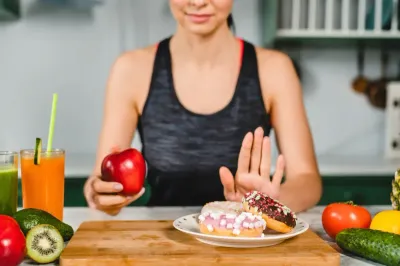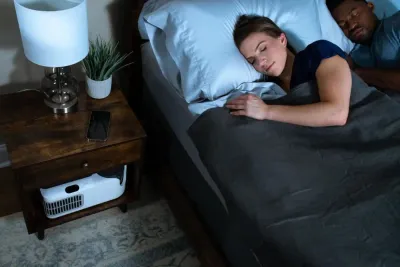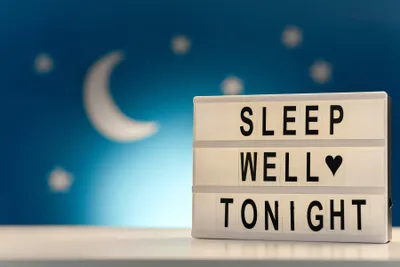
Key Takeaways
Foods that affect sleep influence digestion, body temperature, blood sugar, and brain chemistry. Some foods support relaxation and melatonin production, while others delay sleep or cause night wakeups.
- Foods rich in tryptophan—such as turkey, bananas, and oats—support the production of serotonin and melatonin, hormones involved in sleep and relaxation.
- Caffeine from coffee, chocolate, and certain teas can increase alertness and delay sleep, so it’s best avoided in the afternoon and evening.
- Sugary snacks and refined carbohydrates may cause blood sugar spikes and crashes that can disrupt sleep quality.
- Heavy, fatty, or spicy meals close to bedtime can interfere with digestion and make it harder to fall asleep.
- Timing matters as much as food choice—lighter meals earlier in the evening tend to support more restful sleep.
We all know that sleep plays a pretty big role in our health, but are you aware that what we eat can impact our sleep?
It's true! There are many factors, including certain foods can disrupt your body's natural sleep processes, resulting in restless nights and waking up feeling groggy. This is definitely not how you want to start your day.
We'll walk you through some of the foods we often enjoy that can actually disrupt your sleep, and explain why they have that effect.
Plus, we'll touch on what foods keep you awake at night so you can make better for getting a good night's sleep.
Avoid These Sleep-Disrupting Stimulants
Avoid caffeine and alcohol, especially in the evening, because both can impact your sleep.
Caffeine
Some of our favorite foods have caffeine with out knowing it. They include foods such as chocolate, certain baked goods, drinks, and energy bars. While they might give you a quick energy boost in the afternoon, they can also make it harder to fall asleep and stay asleep.
Did You Know: Caffeine consumption can lead to more frequent rapid eye movement (REM) occurrences (and less time spent in Deep Sleep). This is why might feel groggy in the morning. [1]
Steer clear of foods with caffeine, especially at night. Try caffeine-free options instead, or wind down with calming activities, which can help you sleep better.
Even the slightest amounts of caffeine can affect sleep. So, be mindful of your consumption, especially in the late afternoon and evening.
How Caffeine Disrupts Sleep:
- Increases Alertness: Caffeine increases alertness and delays sleep onset, making it difficult to fall asleep at your usual bedtime.
- Reduces Quality: Even if you fall asleep, caffeine can diminish the quality of your rest, resulting in lighter and less restorative sleep.
- Extends Latency: Consuming caffeine in the late afternoon or evening can increase the time it takes to fall asleep, known as sleep latency.
- Fragmented Sleep: Caffeine's stimulant effects can cause more frequent nighttime awakenings, leading to restless sleep and keeping you awake at night.
Did You Know: We've highlighted the best foods to help your mind and body relax before bedtime. Some foods include cottage cheese, tart cherries, turkey, and more.
Save Up to 20%! Cooler Nights, Better Sleep
Even when you avoid sleep disrupting foods, a bed that runs too hot can still wreck your night. Adjustable sleep temperature control lets you set your mattress from 55°F to 115°F, helping your body cool down and stay comfortable after dinner.
Sugary Foods and Snacks
Be cautious of hidden sugars! Nowadays, sugar is almost everything, from your favorite breakfast cereals to yogurt and even in some energy bars. These foods and snacks with high levels of added sugars can stimulate your mind, resulting in a difficult time falling asleep.
This can potentially lead to insomnia and other common sleep disorders. It’s best to avoid them a few hours before bedtime.
Did You Know: A 2020 study found a clear connection between high-glycemic foods and insomnia in postmenopausal women over a three-year span. [2]
How Sugar Can Throw Off Your Sleep
Eating a lot of sugar can cause quick bursts of energy followed by fast crashes—and that rollercoaster makes it tough to fall asleep. When your blood sugar spikes and drops during the night, it often leads to waking up more often and restless sleep, leaving you feeling groggy the next day.
Having sugary treats or drinks late in the evening can also make it harder to unwind and relax before bed. That doesn’t mean you can’t enjoy sweets—just keep an eye on how much sugar you’re consuming, especially close to bedtime, to give yourself a better shot at peaceful sleep.
- Energy Spikes and Crashes: When you eat sugary foods, your body gets a quick burst of energy, but it’s often followed by a sudden crash that leaves you feeling tired—and that can wake you up during the night.
- Restlessness: Sugar can make your brain more active and interfere with melatonin, the hormone that helps you relax and fall asleep, making it harder to wind down.
- Staying Awake: Eating a lot of sugar right before bed can make your sleep restless and less refreshing overall.
Get the full rundown on sleep struggles in our blog about the common sleep disorders.
Sugary Food Alternatives:
Skip the late-night sugar rush and swap in snacks that won’t leave you tossing and turning. Instead of grabbing candy or cookies, try:
- Fresh fruit for a naturally sweet fix
- Whole grains that keep your energy steady
- Light snacks made with natural sweeteners
These choices are easier on your body and support better sleep when you’re winding down for the night.

High-Fat and Fried Foods
High-fat foods include fast food, fried items, and high-fat dairy products. They usually contain unhealthy fats, such as trans fats and saturated fats, commonly found in burgers, fried chicken, French fries, pizza, full-fat cheese, and ice cream.
While cheese is commonly considered a comfort food, it is actually one of the worst foods to eat before bed, including Cheddar, Swiss, Parmesan, blue cheeses, and gorgonzola, as they contain tyramine.
This can impact your body by increasing the release of norepinephrine, a neurotransmitter that can stimulate brain activity and elevate blood pressure. [3]
Impact on Sleep:
Heavy, greasy foods late at night can mess with your sleep more than you think. That burger and fries might taste great during the game, but your body pays for it later. High-fat meals are hard to digest and can leave you feeling:
- Uncomfortable and restless
- Dealing with acid reflux or indigestion
- Tossing through lighter, broken sleep
Lighter evening snacks are easier on your system and set you up for a better night’s rest.
Smarter Late-Night Alternatives
When late-night cravings hit, you don’t have to settle for greasy comfort food. A few simple swaps can make a big difference for your sleep and how you feel in the morning:
- Lean proteins like chicken, turkey, fish, or beans help keep you satisfied without weighing you down
- Healthy fats from avocados, nuts, or seeds give you lasting energy
- Baked or grilled options are gentler on digestion than fried foods, and still just as tasty
These lighter choices fuel your body without the heavy crash—perfect for winding down at night.

Spicy Foods
A little heat on your plate might taste great, but it can keep you up later than you’d like. Spicy foods—think jalapeños, habaneros, hot sauce, Sriracha, or even seasonings like cayenne, paprika, and curry—can trigger heartburn and make it harder for your body to settle down at night.
If you love spicy meals, enjoy them earlier in the evening so they don’t interfere with your sleep.
Impact on Sleep
That late-night plate of spicy wings or curry might taste amazing, but it can cause more problems than you realize once you hit the pillow.
Spicy foods often trigger heartburn or indigestion, which can wake you up throughout the night. On top of that, they can raise your body temperature, making you sleep hotter and making it harder to fall asleep.
Flavorful Alternatives Without the Heat
Love bold flavors but notice spicy foods mess with your sleep? You don’t have to give up taste—just swap in gentler seasonings that add flavor without the fire. Give some of these a try:
- Mildly seasoned options like garlic, ginger, or a touch of mild paprika
- Herbs such as basil, parsley, thyme, rosemary, and oregano for fresh, savory notes
- Gentle spices like cinnamon, turmeric, or coriander to keep meals tasty without the burn
These swaps let you enjoy flavorful dishes while still setting yourself up for a good night's sleep.
Why Heavy Meals Hurt Your Sleep
Loading up on a big dinner or late-night snacks right before bed can make it harder to fall asleep comfortably. When your stomach is working overtime to digest a heavy meal, you’re more likely to feel bloated, restless, and wide awake instead of relaxed.
If you do need something before bed, stick with lighter snacks that are easier on your system. Your body—and your sleep—will thank you.
Lighter Alternatives:
Choosing smaller, balanced snacks at night can make a big difference for your sleep. Because they’re easier to digest, they help you unwind without feeling heavy. A few great options include:
- A small bowl of oatmeal, which provides calming carbs that support serotonin release
- A banana, packed with potassium and magnesium to help relax your muscles
- Light snacks like yogurt, a handful of almonds, or whole-grain toast with a little peanut butter
Give a few a try and see which option is best for you when you're hungry before bed.

Citrus Fruits
Fruits like oranges, lemons, limes, and grapefruits are really acidic and can cause digestive issues at night. They might irritate your esophagus and trigger heartburn or acid reflux. Both can disrupt your sleep.
If that happens, try sleeping on your left side. This sleeping position has helped many people reduce the frequency of acid reflux episodes.
Processed Foods
Highly processed foods—think fast food and prepackaged snacks—might be a quick fix, but they’re often packed with sugar, unhealthy fats, and other ingredients that can mess with your sleep.
A 2020 study of around 2,500 young adults found that higher intake of processed foods was linked to poorer sleep quality. [4] And it’s not just adults. In an earlier study, research showed that teens who ate more processed foods tended to sleep less and sleep worse. [5]
Try cutting back and see if your sleep improves.
Foods That Can Help You Sleep Better
Some foods support sleep by helping regulate melatonin, calm the nervous system, or keep blood sugar steady in the evening.
- Tart cherries support natural melatonin production.
- Kiwi may help improve sleep onset and duration.
- Almonds provide magnesium linked to relaxation.
- Oats support steady blood sugar overnight.
- Turkey contains tryptophan, involved in sleep hormones.
For a deeper breakdown of how these foods work and when to eat them, read our full guide on the best foods that can help you sleep better at night.
When You Eat Matters as Much as What You Eat
Late eating can quietly work against your sleep, even if the food itself is considered healthy. Large meals close to bedtime keep your digestive system active, making it harder for your body to fully relax and fall asleep.
Big or heavy meals can also trigger blood sugar spikes, which may lead to restlessness or middle-of-the-night wakeups as your body works to rebalance.
For most people, finishing meals two to three hours before bed gives digestion enough time to settle and supports smoother sleep onset. Timing your last meal earlier in the evening is one of the simplest ways to improve sleep without changing what is on your plate.
Conclusion
Getting good sleep is key to your health, and what you eat before bed makes a big difference. Some foods help you sleep better, while others can cause restless nights and tired mornings.
Knowing how caffeine, alcohol, sugary, spicy, high-fat, and certain fruits affect your sleep can help you choose smarter food choices. Look for lighter, balanced snacks, such as low-sugar fruits like berries or apples, to help your body relax, or consider specific drinks.
Making these small changes can boost your sleep quality and overall health—helping you wake up feeling refreshed and ready for the day.
Frequently asked questions
Are Spicy Foods Bad for Sleep?
Remember to steer clear of spicy foods close to bedtime as they can mess with your sleep. They might give you indigestion, heartburn, or even raise your body temperature, making it tough to doze off and stay asleep. To get better sleep, it's best to avoid spicy meals in the evening.
Can Eating Too Much Before Bed Affect Sleep?
Yes, eating too much before bed can negatively affect sleep. A large meal can cause discomfort, indigestion, or acid reflux, making it harder to fall asleep or stay asleep. It's best to eat smaller, lighter meals in the evening to promote better sleep quality.
Can Sugar Keep You Awake?
Yes—sugar can keep you awak. A sweet surge spikes your blood glucose, giving you that “wired but tired” feeling, and when your levels crash later, it can jolt you awake or fragment your sleep.
Studies also show diets high in added sugar are linked to lighter, less restorative sleep.
What foods should you avoid before bed?
Foods high in caffeine, sugar, spice, or fat are more likely to disrupt sleep.
Is it bad to eat right before bed?
Eating large meals close to bedtime can delay sleep and increase night wakeups
How long before bed should you stop eating?
Most people sleep best when they finish eating two to three hours before bedtime.
Peer-Reviewed Research References
-
Weibel, J., et al.
Regular Caffeine Intake Delays REM Sleep Promotion and Attenuates Sleep Quality in Healthy Men.
Journal of Biological Rhythms, 2021.
Study Type: Experimental Sleep Study
Key Finding: Found that habitual caffeine intake delayed REM sleep onset and reduced overall sleep quality, even when caffeine was consumed earlier in the day.
View Study
Source URL: https://pmc.ncbi.nlm.nih.gov/articles/PMC8276335/
-
Gangwisch, J.E., et al.
High Glycemic Index and Glycemic Load Diets as Risk Factors for Insomnia.
American Journal of Clinical Nutrition, 2020.
Study Type: Large Observational Cohort Study
Key Finding: Found that higher dietary glycemic index and glycemic load were associated with an increased risk of insomnia, particularly among postmenopausal women, suggesting diet quality may influence sleep regulation.
View Study
Source URL: https://pmc.ncbi.nlm.nih.gov/articles/PMC6997082/
-
Good Food Is Good Medicine.
Does Decaf Coffee Actually Have Caffeine?
Good-Food, 2019.
Source Type: Nutrition & Lifestyle Education Resource
Key Insight: Explains that decaffeinated coffee still contains small amounts of caffeine, which may be relevant for individuals sensitive to caffeine’s sleep-disrupting effects.
-
Sousa, R. S., et al.
Association Between the Degree of Processing of Consumed Foods and Sleep Quality in Adolescents.
Nutrients, 2020.
Study Type: Cross-Sectional Nutritional Study
Key Finding: Found that higher consumption of ultra-processed foods was associated with poorer sleep quality among adolescents, suggesting dietary patterns may play a role in sleep health during adolescence.
View Study
Source URL: https://pmc.ncbi.nlm.nih.gov/articles/PMC7071336/
-
Min, C., et al.
The Association Between Sleep Duration, Sleep Quality, and Food Consumption in Adolescents: A Cross-Sectional Study.
BMJ Open, 2018.
Study Type: Population-Based Cross-Sectional Study
Key Finding: Found that shorter sleep duration and poorer sleep quality were associated with less healthy dietary patterns, including higher consumption of fast food and sugary beverages among adolescents.
View Study
Source URL: https://pmc.ncbi.nlm.nih.gov/articles/PMC6059317/









